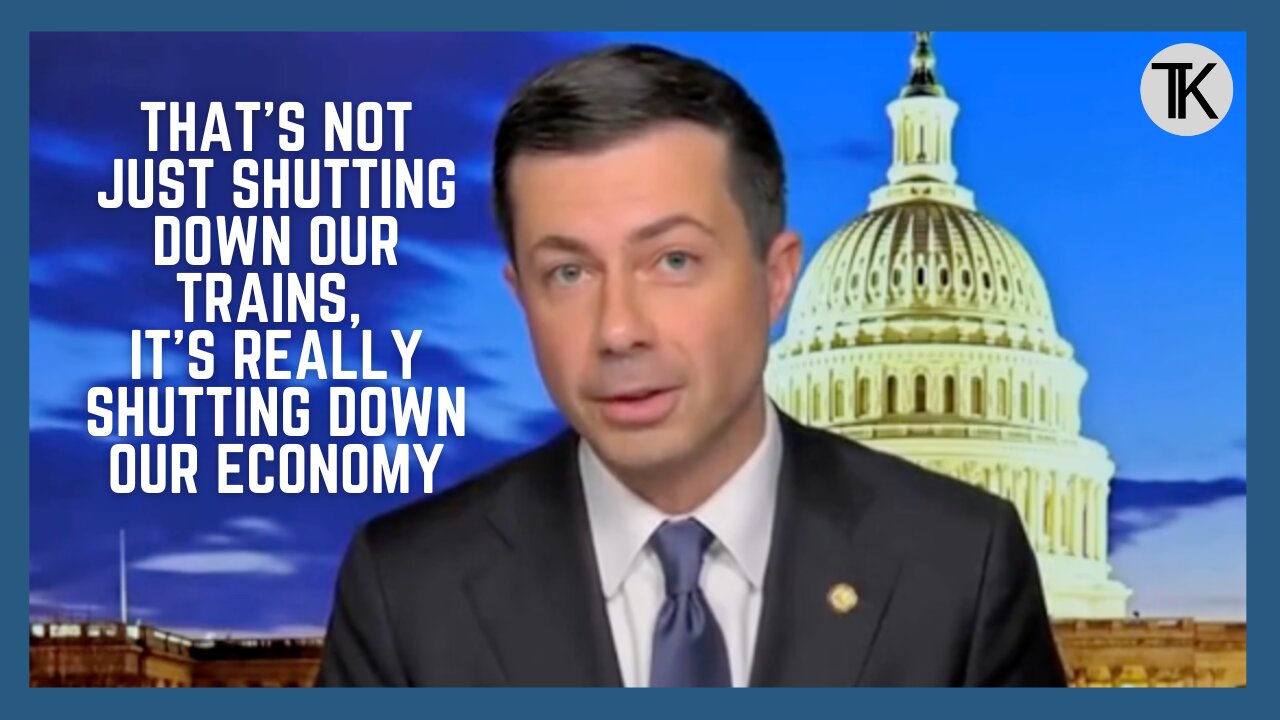Premium Only Content

Buttigieg: Rail Strike Would Really Shut Down Our Economy
BUTTIGIEG: “I think it will, I hope it will. I’m going to be spending time with senators today, mainly to make sure they understand the implications of inaction for our transportation system. As you saw in the piece reported earlier, there is no substitute in the U.S. for functioning freight rail. And if a shutdown were to occur that’s not just shutting down our trains, it’s really shutting down our economy. Immediately you would see effects, including when it comes to inflation prices shooting up because of the cost of shipping, you would see water treatment plants, in some cases, fairly quickly running out of the supplies that they need, and you could have American citizens and cities around the U.S. being told they need to boil their water or — or resort to bottled water. Within a few days, you would start to see our ports unable to operate because they couldn’t ship the goods out of — of the ports. So they would eventually get so congested they’d have to turn ships away. You would see our auto industry very quickly grinding to a halt, because many facilities only have a couple of days of parts on hand. We have [indecipherable] thousand layoffs in the first two weeks of a shutdown with more to come [indecipherable] that those laid off workers would get their jobs back after a disruption ended. So my main concern is to make sure that the senators understand the implications of any kind of delay here with the clock ticking. Now I do think it’s frankly impressive to see how quickly after Speaker Pelosi brought that to the floor yesterday, there was a strong bipartisan vote to enact that tentative agreement. You know, this town is not known for working quickly. So it was, I think a reflection of the urgency of the matter that the House moved. That was such a strong vote. Now we need the Senate to do the same, get a bill to the president’s desk. And really that — that bill needs to reach the president’s desk this week or by this weekend in order to avoid some of the initial effects for our economy.”
GEIST: “And the president has said that as well. They’re still counting the votes, got to get to 60 — not clear that they have those votes just yet. Mr. Secretary, as you’re well aware of the railroad unions are not happy about being forced into this position and having their strike blocked by the United States Congress with the backing of a president who often touts his pro union credentials. What do you say to the unions this morning?”
BUTTIGIEG: “Well, yes, look, this is obviously something that a lot of leaders are looking at with reluctance. The president prides himself, and this administration prides itself, on being the strongest pro-union administration in modern times. What we’re talking about is a tentative agreement that was reached by labor leaders and companies at the bargaining table, including that 24 percent pay raise, average six figure pay for rail workers, and speaking to some of their other concerns about benefits and quality of life. They have further concerns, very legitimate ones when it comes to the ability to take sick leave. And, you know, this reflects a compromise at the bargaining table that none of the sides thought was perfect, but is what it took to reach that that preliminary accord. What I’m trying right now to make sure everybody understands is what would happen to our country, if there were to be a shutdown.”
-
 4:13
4:13
Tony Katz
4 months agoRadical Left Judges Obstruct Deportations
364 -
 2:10:32
2:10:32
Side Scrollers Podcast
18 hours agoStreamer Nearly Beats A Man to Death on Stream + Twitch Viewership PLUMMETS + More | Side Scrollers
6.41K6 -
 13:09
13:09
Forrest Galante
1 day agoWildlife Expert Reacts To Deadly Australian Animal TikToks
78.3K14 -
 23:47
23:47
GritsGG
2 days agoThe Forgotten Best Sniper Support AR!
27.4K4 -
 10:18
10:18
The Pascal Show
17 hours ago $0.44 earned'I WILL NOT GIVE UP ON MY BABY!' Emmanuel Haro's Mom Breaks Silence From Jail?!
5.64K -
 LIVE
LIVE
Lofi Girl
2 years agoSynthwave Radio 🌌 - beats to chill/game to
176 watching -
 2:33:04
2:33:04
Badlands Media
14 hours agoBaseless Conspiracies Ep. 147: Pole Shifts, Plasma Skies, and the Truth About Cataclysms
171K17 -
 4:33:42
4:33:42
Drew Hernandez
10 hours agoISRAEL BOMBS GAZA HOSPITAL ON LIVE TV KILLING AT LEAST 20 INCLUDING JOURNALISTS & CIVILIANS
24K77 -
 2:55:23
2:55:23
TimcastIRL
9 hours agoTrump Orders Specialized National Guard Units To Combat Crime In Cities, Dems Furious | Timcast IRL
212K147 -
 6:22:03
6:22:03
SpartakusLIVE
10 hours ago#1 Rocket CHAMPION of Verdansk wields UNSTOPPABLE new META
84.2K5